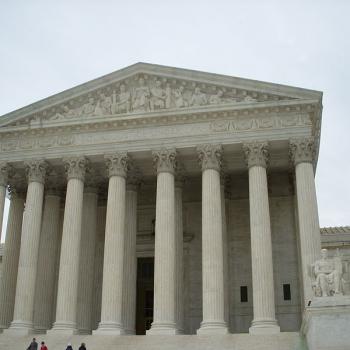Thou shall inherit the holy earth as a faithful steward, conserving its resources and productivity from generation to generation. Thou shalt safeguard thy fields from soil erosion, thy living waters from drying up, thy forests from desolation, and protect thy hills from over-grazing by thy herds, so that thy descendants may have abundance forever. If any shall fail in this stewardship of the land thy fruitful fields shall become sterile stony ground and wasting gullies, and thy descendants shall decrease and live in poverty or be destroyed from off the face of the earth.
In 1939, soil scientist Walter Lowdermilk suggested in a radio address in Jerusalem that we needed another commandment to guide human behavior, namely – an obligation to care for creation.
I always teach Lowdermilk’s essay at the beginning of my Environmental Ethics classes because it such an important example of recognizing the positive value that religion can play in establishing enduring moral obligations that can shape human behavior in broadly altruistic ways.
The 10 Commandments represent a set of ethical principles that are intended to guide the behavior of Jews and Christians. The first four commandments relate to ritual and worship (I am your God and you shall worship only me, do no worship idols/images, do not engage in blasphemy, and keep the Sabbath holy).
The remaining six commandments speak of the moral obligation that people have to one another, these are the principles that shape human relations (honor your parents; don’t kill, have sex with people you aren’t married to, steal or lie; and don’t covet other people’s things).
In his now classic essay, Lowdermilk argues that the presence of an 11th Commandment might have mitigated the human tendency throughout history to exploit, despoil, abuse, and destroy the natural world. Indeed, Lowdermilk goes so far as to suggest that Christians ought to have a Trinitarian understanding of moral obligations that exist in relation to God, to one another, and to creation.
Lowdermilk was born in Liberty, NC – not far from where I now live but his work as a scientist, engineer, and environmentalist took him around the world. From the Belgian Relief Commission during WWI to flood control in China to soil conservation in Israel. Lowdermilk is said to have described his profession as reading “the records which farmers, nations, and civilizations had written in the land” and then applying that knowledge to figure out how to use land in ways would conserve its productivity indefinitely.
One of the things that makes the 10 Commandments so effective is their brevity and straight-forwardness – “Thou shalt not kill.” So while Lowdermilk’s sentiment is well-placed and deserving of some attention, perhaps his proposal would be more effective if we reframed it so it were more analogous with the current commandments. Since it is not particularly a ritual obligation, we will skip the first four commandments. Of the next six, we have positive injunctions (Honor thy father and thy mother) and negative injunctions (thou shalt NOT. . . ).
Since Lowdermilk’s desire was to inspire a recognition of the sacred nature of creation and to elicit behavior that recognized and affirmed that sacredness, it seems most appropriate to model an 11th commandment as a positive injunction, therefore, it seems fitting to condense Lowdermilk’s suggestion for an 11th Commandment to “Honor the earth.”
Lowdermilk’s insight is as relevant today as it was more than 75 years ago. While his concern was largely related to the conservation of soil and water, the damage to our atmosphere and the very health of our planet and many of its species has only deteriorated in the intervening years.
Given the reverence with which the Genesis 1 text describes God’s creation of the natural world accompanied by the repeated refrain that God saw that each aspect of creation was “good,” it is no stretch to imagine that God does desire that we “honor the earth,” even if it was not recorded as an 11th Commandment.
The 10 Commandments are intended to shape the moral and religious behavior of Jews and Christians. The question that faithful followers of these traditions must ask is how would our behavior change if we lived by the commandment to “honor the earth?”













